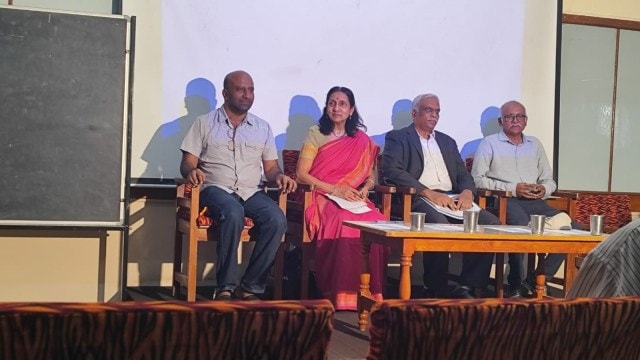New municipalities under Greater Bengaluru Authority to disrupt reservation rotations, undermine equity: Former IAS T R Raghunandan
CIVIC Bangalore organised a seminar on the Greater Bengaluru Governance Act.
 T R Raghunandan urged Bengaluru to adopt the “Manila and Brussels model”, stating that decentralised municipalities with clear roles foster accountability. (Express Photo)
T R Raghunandan urged Bengaluru to adopt the “Manila and Brussels model”, stating that decentralised municipalities with clear roles foster accountability. (Express Photo)Retired IAS officer T R Raghunandan Saturday warned that frequent delimitation and formation of new municipalities under the newly formed Greater Bengaluru Authority (GBA) will disrupt reservation rotations for Scheduled Castes (SCs), Scheduled Tribes (STs), Other Backward Classes (OBCs), and women candidates.
“Their (government’s) aim is to prevent rotation of reservation from proceeding logically,” he said, claiming that such tactics violate the 74th Constitutional Amendment’s equity mandates. He made the remark while speaking at a seminar organised by CIVIC Bangalore on the Greater Bengaluru Governance Act (GBGA).
Raghunandan also urged Bengaluru to adopt the “Manila and Brussels model”, stating that decentralised municipalities with clear roles foster accountability. He, thereafter, argued that frequent delimitation creates new electoral cycles, allowing political actors to dilute the representation of marginalised groups.
Raghunandan further noted that GBGA’s devolution of 18 subjects is “vague and ineffective”, pointing out the lack of specific tasks for representatives. “That means nothing,” he said, criticising the “PowerPoint knowledge” approach that renders corporations symbolic. He stressed the need for precise role delineation to counter bureaucratic resistance and ensure functional governance.
Raghunandan also flagged centralised control, with the GBA’s state-appointed officials and initiatives like Smart City Private Limited bypassing elected bodies, creating “elected monarchies”.
Calling devolution a “political battle,” Raghunandan urged engagement with ex-corporators to counter elite dominance.
“Karnataka’s Panchayat Raj empowered marginalised groups through clear roles, but urban governance lags. The GBA needs to be challenged by ex-corporators’ engagement to fight elite dominance. Devolution is a political battle requiring accountability to ensure Bengaluru’s corporations serve all communities equitably,” he said.
Kathyayini Chamaraj, Executive Trustee, CIVIC Bangalore, argued that the recently passed GBGA undermines the 74th Constitutional Amendment by centralising control under the state-led Greater Bengaluru Authority (GBA), headed by the chief minister.
She then contended, “The state, not BBMP, failed by delaying elections for years, weakening local self-governance and depriving citizens of responsive urban governance.”
“Splitting BBMP into seven corporations hinders equitable resource distribution, ignoring Delhi’s re-merger lesson. The state’s failure to activate the Metropolitan Planning Committee caused Bengaluru’s ‘ruined’ growth, violating the 74th Amendment’s mandate for vibrant local self-governance,” Chamaraj said.







